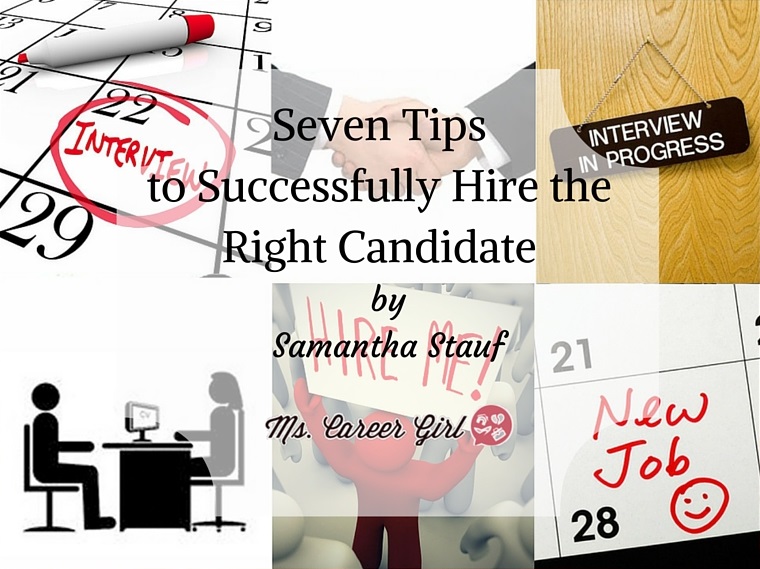Seven Tips to Successfully Hire the Right Candidate

Employees are the life blood of the company. Every employee completes a multitude of tasks necessary for the company’s financial success. Each new employee incorporated into the company swiftly begins to affect the overall financial health of the company. Hiring the right person can revitalize a company. Hiring the wrong person can cost an employer thousands of dollars.
I have good news and bad news. The good news: hiring is as easy as 123. The bad news: hiring the right person is infinitely harder.
Determining whether candidates are right for the company is a skill that must be honed. This puts new hiring managers and, especially, new companies at an extreme disadvantage. Fear not. Here are seven steps to help novice hiring managers make the right hiring decision.
One: Experiment with Job Posting Websites
There are a variety of ways to find potential job candidates. Don’t just utilize one method. While Craigslist ads, twitter posts, and employee recommendations can locate a variety of talented potential employees, the pool of job seekers that those methods reach can be relatively small. There are dozens employee websites that can provide you with dozens of potential candidates. On top of those other methods, I would recommend employees try utilizing at least one of the higher quality employment websites.
Two: Always Conduct an Interview
You’ve found a potential candidate! Their credentials seem great; they seem to know one of your valued employees. You might be thinking, they’re a great fit. Slow down for a second. Never hire without at least conducting a semi-formal interview. While an interview does not guarantee that you’ll never hire a “bad” employee; it will potentially reveal signs that the employee might not be a good fit at least part of the time. Every poor hiring decision you dodge will save the company money.
Three: Tag Team Interviews
Try to have at least two individuals interviewing each candidate. This is especially important if the person in charge of hiring has no experience hiring new employees. Two interviewers have a better chance of noticing the signs that a candidate might not be a good fit.
Four: Recognize Your Own Prejudices
Before conducting any interviewers try to iron out factors that might unwisely discount good candidates. One hiring manager I know, for example, would discount any individual who had a history of filing for workers compensation from their previous company. Even more ludicrous, her husband had been on workers compensation. At the end of the day, interviewers can’t assume everyone who exhibits something that triggers that prejudice is a scammer, a criminal, or a poor fit. By allowing prejudices to unconsciously rule, interviewers could potentially discount experienced, hardworking employees.
Five: Double Check Employee Recommendation
Employee recommendations streamline the hiring process. Employees know the skills and knowledge candidates need to have to excel. And due to the fact the strength of the team is based on the efficiency of every employee, they won’t be eager to suggest candidates that won’t be a good fit.
Don’t just assume though that if an employee is listed as a reference or mentioned in the interview, that the employee has actually recommended them. Recently, my step-dad was listed as a reference by one of his casual acquaintances. He only found out about the individual using his name to land the job after the fact. If they had inquired about the recommendation, they would have discovered the man will not be a good fit for the job.
Six: Hire with the Brain Not the Heart
It’s a hard-knock life. Some people get knocked down a tad more than others throughout their life. You can be empathetic, but don’t allow sympathy for a candidate’s plight be the overarching reason you on-board a new employee. Yes, it’s nice to be charitable, but you also need to ensure the candidate has the skills and knowledge to complete their tasks. It’s not fair to the team, the company, or even the candidate to put them in a position they have no chance to succeed in.
If an employee makes an emotional appeal, try to steer the conversation back to their qualifications. You want to give them a job? Great. Give them the best chance to prove they have the chops to do the job. If they don’t fit with the position, you will serve them and the company far better if you point them toward a position (inside or out of the company) they are qualified to fill.
Seven: Double Check Credentials
Candidates sometimes lie. It’s a fact of life. They need a job; you’re hiring; they sometimes can’t afford to pass on an opportunity even if they aren’t entirely qualified. It’s the interviewer’s job to root out the potential lies. Here are a few tips to root out problem candidates:
- Fact check utilizing their social media platforms.
- Verify that potential employees actually graduated with the degree they claimed.
- Ask technical questions to prove they have the skills and knowledge they claim to have.
Hiring the right employee is important. Unfortunately, hiring the right employee can be extremely difficult. By honing interview screening skills and processes, hiring managers and companies can increase their chances of locating the right individual for the job.




